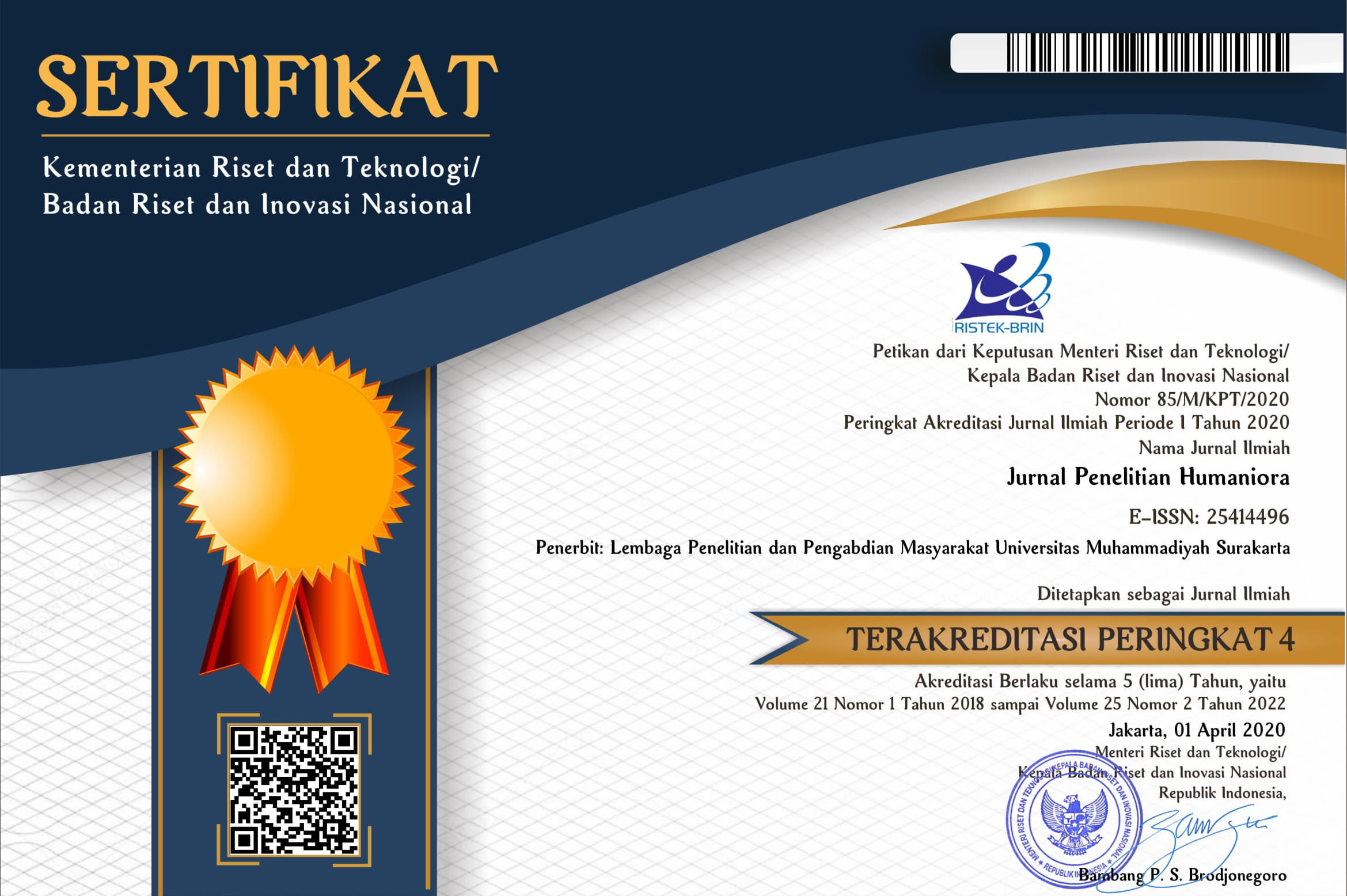EXPLORING TEACHERS' BELIEFS ON TEACHING METHODOLOGY IN THE 2013 CURRICULUM AND THE APPLICATION IN LANGUAGE TEACHING: A CASE STUDY AT MTS PPMI ASSALAAM SUKOHARJO
Zainal Ariffin(1*)(1) MTS PPMI Assalaam Sukoharjo
(*) Corresponding Author
Abstract
Keywords
Full Text:
PDFReferences
Creswell, John W. 2007. Qualitative Inquiry and Research Design: Choosing Among Five Approaches-2nd ed. London: Sage Publications Ltd.
Chu, Yu-wei. 2014. Teachers’ Beliefs in Teaching English for Kids at a Kindergarten: A Case Study of Students from the Department of Applied English. English Language Teaching; Vol. 7, No. 10; 2014. ISSN 1916-4742 E-ISSN 1916-4750 Published by Canadian Center of Science and Education.
Evans, Robert, Julie Luft & Charlene Czerniak (Eds.), 2014. The Role of Science Teachers’ Beliefs in International Classrooms. The Netherlands: Sense Publishers.
Fauziati, Endang. 2015. Teaching English As a foreign Language: Principle and practice. Surakarta: Era Pustaka Utama.
Gonçalves, Teresa N. R., Nair Rios Azevedo, & Mariana Gaio Alves. 2013. Teachers’ Beliefs about Teaching and Learning: An Exploratory Study. Educational Research Journal. 2013, vol. 2, N 1 University of Alicante.
Hongboontri, Chantarath & Natheeporn Keawkhong. 2014. School Culture: Teachers’ Beliefs, Behaviors, and Instructional Practices. Australian Journal of Teacher Education. Volume 39, Issue 5 Article 5, 201. 65-88
Larenas, Claudio Díaz,. Paola AlarCón Hernandez, & Mabel Ortiz Navarrete, 2015. A Case Study on EFL Teachers’ Beliefs about the Teaching and Learning of English in Public Education. Received: 1 January 2013 / Accepted: 31 July 2014. ISSN: 1697-7467. Porta Linguarum 23, enero 2015 171-186.
Li LI. 2012. Belief Construction And Development: Two Tales Of Non-Native English Speaking Student Teachers In A Tesol Programme. Novitas-ROYAL (Research on Youth and Language), 2012, 6 (1), 33-58.
Mahmoudi, Halimeh Mohammad, Seyedeh Sara Jafari, & Fatemeh Ziyaei. 2015. Teachers’ Beliefs of Effective Teaching in the Foreign Language Classroom: A Study of Nonnative EFL Teacher. ©JK Welfare & Pharmascope Foundation. International Journal of Review in Life Sciences. ISSN 2231-2935. 5(6), 2015, 1-6.
Melketo, Tagesse Abo 2012. Exploring Tensions between English Teachers’ Beliefs and Practices in Teaching Writing. The International HETL Review, Volume 2, 2012 (98-114). Retrieved on https://www.hetl.org/wp-content/uploads/2013/09/HETLReviewVolume2Article11. pdf.
Miles, M. B. & Huberman, A. M. 1984. Qualitative Data Analysis: A Sourcebook of New Methods. California; SAGE publications Inc
Nhapulo, Marcos Abilio. 2013. Teacher and learner beliefs and expectations about English language teaching and learning at a Mozambican university. Africa focus — Volume 26, Nr. 2, 2013-pp. 81-109. Retrieved on http://www.afrikafocus.eu/file/29.
Nunan, David. 1989. Designing Task for Communicative Classroom. New York: Cambridge University Press.
Richard, Jack C. and Lockhart, C. 1994. Reflective Teaching in Second Language Classroom. Cambridge: Cambridge University Pres.
Shim, Jenna Min. 2014.A Bourdieuian Analysis: Teachers’ Beliefs about English Language Learners’ Academic Challenges. International Journal of Multicultural Education. 2014. Vol. 16, No. 1. Retrieved on http://ijme-journal.org/index.php/ijme/article/ viewFile/783/941.
Siddiquee, Muhammad Nur-E-Alam & Hideo Ikeda. 2013. Science Teachers’ Beliefs on Teaching and Learning at Secondary Schools in Bangladesh. GSE Journal of Education 2013 (ISSN 2289-3970) WorldConferences.net. 37-68. Retrieved on https://worldconferences.net/ journals/gse/GSE%204%20NUR%20ELAM.pdf.
Article Metrics
Abstract view(s): 911 time(s)PDF: 484 time(s)
Refbacks
- There are currently no refbacks.











